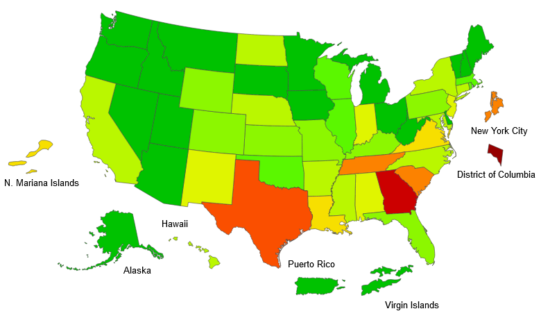Metric system failure, why the Plague still matters, flu numbers spike, and more
21 Oct 2022
Posted by Andrew Kantor
The flu is here

The Georgia DPH reports: “Flu activity is already widespread in Georgia — earlier than we’ve seen in recent years.” Georgia is currently second in the nation for flu cases (behind Washington, DC), rated a 10 on the 13-level scale.
Don’t forget to register for your region meeting!
They start October 27 with Region 5 (“The Fighting 5th” — DeKalb, Forsyth, North Fulton, Gwinnett, Newton, and Rockdale counties) and run through November 10 (regions 4 and 6).
Good news: All registration links are now active! We’ve got final confirmation from the restaurants, so see where yours is and sign up now!

Artist’s conception
Region meetings are the perfect balance of fun and relaxing — a great dinner with friends and colleagues from your (wait for it…) region.
Get out from behind your counter, find your meeting, and register today at GPhA.org/regionmeetings! (There’s also a handy region map on the page.)
The bad news: Thanks to new ACPE guidelines, we can’t offer CE credit any more. Then again, we know most of you came for the great meal, and awesome attendees.
The sound of crickets
The FDA has approved Novavax’s Covid-19 vaccine as a booster for people who got Pfizer or Moderna’s mRNA shot, but now want a non-mRNA booster. For reasons.
A simple error (and a reminder)
Pharmacy Times would like to remind you to “Be Wary of the Wrong Dosing Unit Being Used in Directions”.
The case they highlight is one where the correct dosage — “Inject 1 mL under the skin every 2 weeks” — was dispensed with the directions “Inject 1 mg under the skin every 2 weeks.”
Double-checking is good, but taking a moment to write patient-understandable directions might be better.
For example, although the doctor wrote “inject 1 mL,” clearer and more instructive directions based on the design of the pen device would have been “inject the contents of 1 pen under the skin every 2 weeks.”
All that talk about the Metric system being better because you can convert cc’s to mℓ’s to g’s — that’s great … if you’re working with distilled water at sea level.
On that note…
Your brain gets tired at the end of the day, even if you’re not doing a physically demanding task. Brain work is work, too, and it results in a buildup of glutamate. And, explain a couple of neuroscientists, “[I]n large quantities glutamate alters the performance of a brain region involved in planning and decision making, the lateral prefrontal cortex.
Thus at the end of the day, you’re more likely to make mistakes and bad decisions — a typo on patient directions, or a quick stop for gas station sushi.
During their shift, air traffic controllers only guide aircraft for up to two hours, followed by a half-hour break. But bus drivers, clinicians and pilots would benefit from regular, compulsory rests too.
The Death that keeps on giving
The Black Death leads to Crohn’s disease. Sort of.
An international research team found that the same genes that protected people from the capital-P Plague are a double-edge sword; they’re also “associated with an increased susceptibility to autoimmune diseases such as Crohn’s and rheumatoid arthritis.”
The details are more complicated — people with two copies of the protective gene (ERAP2) are the ones who have to worry — but it’s one of those fascinating looks at how history sticks with us.

If you know the story, this drawing is particularly creepy.
Something to know about baby formula
- Most babies don’t need lactose-free or lactose-reduced formula.
- Those that contain less lactose usually substitute other sweeteners — think corn syrup — that are definitely not good for Baby.
“Breast milk is the gold standard, so lactose-reduced brands are a big deviation if the baby doesn’t need it medically.”
US life expectancy isn’t rebounding
First, the usual caveat: Life expectancy data doesn’t really tell you how long you’re likely to live, but it is a decent measure of overall health in an area over time.
That’s why the big Covid-19 drop was so important — it showed that nothing since World War II killed so many younger people around the world.
New data, though, show that while much of the world rebounded in 2021, the US, Germany, and much of Eastern Europe all saw life expectancy continue to drop.
Faring the worst in 2021: Bulgaria. The best: Norway, as always — the only country with a higher life expectancy in 2021 than in 2019.

They grow ’em tough
Why is this?
Per a Florida Atlantic University report:
“Of the 10 richest countries in the world, the U.S. ranks last in vaccination rates and first in both numbers and rates of COVID-19 deaths.”


